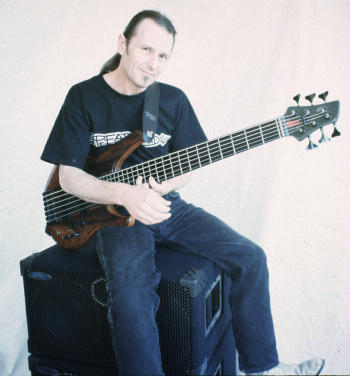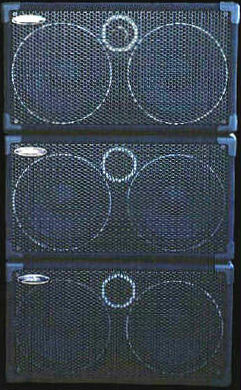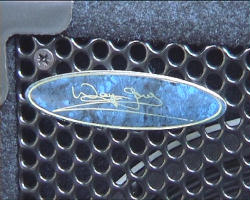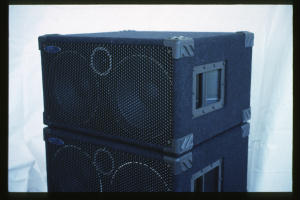When we first start out as players, unless guided by someone
more experienced, we invariably waste a lot ot time and sometimes a lot of money
chasing equipment until we come across The Right Stuff. Many if not most
of the artists that appear on our pages act as endorsees for both up and coming
builders and manufacturers and the more established ones as well.
More often than not, however, most of these artists are still in 'Search
Mode".
Most of them confide in us that much in as all as they appreciate the equipment
they have received and are happy to tell others about the stuff, there is still
a part of them wondering if the next bass, the next effect, the next pickup, and
definitely, that next amplifier or cabinet, will bring them closer to Tonal
Nirvana.
Some people eventually reach a point where they begin the think that the ONLY
way they will ever have any control over when they get to their goal is if they
build the equipment themselves.
That brings us to the story of Wayne Jones, established studio musician and club
player is Melbourne, Australia. "I've been about 25
years pro now, full time as a bass player. I started off as a drummer.

I used to be into Soul and that sort of
stuff when I was about 15 or 16. I dropped my apprenticeship as a
boilermaker/welder and went pro at 16. You don't know what you're gonna do when
you leave school. You say to your parents you want to be a drummer, and out you
go!
Global Bass: So steering yourself towards
being a Boilermaker would at least let you live there for a couple of years
until they figured out what was really going on.
Wayne Jones: In
those days, we were virtually pioneers. There was no education in modern music.
It was all Classical. There was no where to go to learn Pop, Jazz, Blues,
anything like that. You virtually had the records and that was it in those days.
GB: Is there a sense in Australia that in some ways
musically that you are very much at the other end of the world musically?
Wayne: Well,
we always have had, but because there is such a healthy live scene here, you
would have 'gig chops' from hell! I've played four, five nights a week for
years. It used to be stuck with an attitude of inferiority because of leading
nations like America and England.
Before they would have faith in Australian musicians here, the public would more
look to Overseas, but it has turned it's head right around. Finally.
GB: You have a lot to be proud of.
Wayne: In
lots of ways, and we always have, but it's been a small country, population and
finance-wise for the Arts, so people just end up leaving.
I've done sessions for music for movies at bare minimum
rates but there is nothing to cover any royalties on what you do here as a
session player. But because of the shrinking of the world now, they can't
control it so much anymore. Things are coming more into line than what they
were, more than they ever have been. Consequently, the scene here has changed
from a really healthy touring pub circuit, as we used to call it, to just the
bars and some clubs and the international touring acts.
Australia doesn't seem so much cut off anymore. But we are a long long way away!
(laughs) Melbourne has a pretty healthy scene, it's probably the best.
Sydney is second. It's not that healthy here at the moment, but we had it so
good for so many years, I guess we can't complain.
GB: Are you doing a lot of work these days, a
lot of live playing?
Wayne: There
are actually five of us that do most of the work in the city. All the freelance
stuff, up till September I was, but I have done bugger-all since. Shows you how
the scene has dropped since then. Freelance players are a bit out in the cold.
The live band quality has really gone down. Touring acts aren't touring here so
much, they are touring overseas, which is great.
GB: What about doing commercials and work
along that line?
Wayne: That's
all just in-house stuff now. Computer studios etcetera. It's gone a lot towards
corporate. If you want to live comfortably off playing, then it's corporate work
you want.
GB: So it's a time of great change in
Australia.
Wayne: Craig
Calhoun, a friend of mine and one of my endorsees,has been composing for cable
in his studio in Sydney, and playing in his own corporate thing, but he is
getting concerned as well. I've even found myself doing a couple of
days work in call centers. It's customer service on the phone. It's what's going
on here. That's the change, but on my part some of it is my own doing.
GB: In what way?
Wayne: A couple
years ago I just took stock of all my skills over the years. Where am I gonna
go, I've done everything here. I could go overseas and do some touring with an
international thing. That's the next challenge for me. I
decided to make these boxes with all the experience I had.
GB: >From a business point of view, if
things are in flux, this might be good timing for you to do this. Time for you
to be changing. If you can get this rolling for yourself, this will at least
take care of you from a financial point of view.
Wayne: And then
I could have the means to finish my CD or go to work in the States for a while
or in England for a while. That's why I put myself out of work in a way. I
didn't realize I was getting most of the work anyway! I purposely took the time
from playing and put it into the speaker box business. What we have achieved
with this ten-inch speaker blew me away. No one else has ever done what these
things sound like. As a musician to blow yourself away, if pretty good! They are
a hi-fi monitor virtually. The Subs are low and tight,and the rest of the
frequencies are crystal clear. I offered it to a couple companies in England.
GB: You would offer to sell the rights to
these speakers.
Wayne: Well, the
reason for doing that would be for my own future and my kids. I wanted to play
bass as a musician. If you have the skills and can pass them on to somebody else
who can benefit,and take it further than us the right way,why not.
GB: Are you still actively looking for
companies that will pick this up?
Wayne: Not
anymore really,but we haven't closed the door on a good offer. I got together
with Clem (Giuliano) when I got back (from England). Clem was an ex-student.
He's got a bit of the musician in him and was looking for some kind of business
to get into. He was supportive of me all along, when I went to England,
financially as well. It cost me a fair bit to take two cabinets over there for a
meeting with these people. (Laughs)

Click
on the 3-stack to read Mark Peterson's review
of WJA
These people, I used to endorse their
stuff and I got them going here in Melbourne with all the musicians. It's a big
company, but they had no money. I wanted to be bought out and they just wanted
to make `em.
So when I got back, Clem just said to me, "Come on in", and together,
just the two of us, we have sunk over $80,000 in the last year. The
problem is that they are so expensive to produce, which is why if they were
retailed, they would be around$2000 USD each. Here in Australia they would be
around $2500 AUD . So no retail,and direct to their door, they are $1250
USDollars all Inc.(Freight Duty etc.)
I sent out a proposal to retailers in Canada and the U.S, of course they were
scared, because they didn't know what it was. Of course, they were gonna ask for
consignment.
GB: Yeah, they want to take no chances. So to
make sure I have this, they would be around $1250 USD
Wayne: That's
from us, to their door, with everything paid for. It's a modular system though,
they are best purchased in pairs. So for the two cabinets you are up to about
$2500 US.
GB: They are getting up there in price, but
recently in an interview I was talking with a distributor and he was saying that
for speaker cabinets, this is where a lot of bassplayers actually start to
scrimp a bit on the money. They go to great lengths to buy the best bass they
can afford, the best power amp, change their strings as often as they can, buy
the best effects and then they will go out and pick up a $300 cabinet.
Like the home stereo, I can't help but wonder if one of the most important parts
of the 'chain' in the creation of music, just like it is in the reproduction of
music in a home audio system, is the speaker assembly.
Wayne: I think
that the stage things are in the world, cabinets are getting much more efficient
in what the bass player requires. Big companies like Epiphani, GlockenKlang. It
won't take us long once players get to see what we have done.
GB: This is what I am getting to.
Perhaps people need to chance their thinking, if they want audiophile sound,
they are gonna have to pay for it. But they will never be sorry that they did,
their search will be over for the best cabinet if they invest the necessary
money in an audiophile cabinet.
Wayne: We are
just now working at the stage of getting them into shops, although if it keeps
working on the Internet, we'll just keep going. But there is nothing like having
cabinets in the shop for a player to go and play.
GB: The endorsees you've chosen.with Brent
Anthony Johnson, how did that come about?
Wayne: I was in
London at the time, staying with my Australian singer friend. I had my own
little site up on the `net that is now incorporated into the bigger site and
Brent was reading through my list of endorsements, for things like Status and
things, and he had been wanting a Status endorsement for years. He just emailed
me, ask me how the hell I got the Status endorsement and we got to be friends
over that.
We got to talking about what each other does and he told me he wrote for Bassics
etc., and then bang, I've got the story right now.
GB: You had been playing for a long time,
never quite finding however 'just that sound' in any of the cabinets you used. I
imagine however that in all that time you had a picture in your mind as to the
sound you wanted, the voice you were after.
Wayne: Most bass
players have that sound in their head, the sound they really want.
GB: Did you do the usual, different strings,
picks, amps, pickups, boiling strings, different speaker configurations.
Wayne: Oh yeah,
you name it, I tried it. I've used Acoustics like Jacos, H & H, Orange,
Fender, HiWatt, Gallien-Kreuger, EV's, Trace-Elliot (I was their clinician for a
year). Along the way, my old man was a wood machine person, building caravans
and stuff, so we actually built a couple, for the lack of finances.
It started to interest me of course, you're always searching for sounds as a
player. It just got more Hi-fi over the years. Sounds like Marcus (Miller) and
Brian Bromberg's etc.
Most bass players would practice at home in their stereo and say, "Why
can't I get that high fidelity on stage?" Then SWR comes
out with something using 10's. The attack was so good out of the 10's but you
could never get the full range out of them. Most bass players would use
multiples of them but you could still never get the
full range.
I delved into it with a previous design here.they were quite good, but a bit
muddy. So I got together with a speaker manufacturer here. Michail Barabasz, he
manufactures speakers, but I designed this one myself. He and I put our head
together and came up with a design.


GB: So do you see yourself expanding the
line, perhaps into different configurations?
Wayne: Where I
would like to go with it is to design an amp next to go with and to make the
quality of the speakers. Maybe a power amp and a preamp. Maybe a computer one as
well. Configuration-wise, I don't know, maybe I'll bring into some kind of
combo.
Presently though, it's designed as a modular system. For a small gig you use
one, or you can use two, three, or four. They take so much power.
GB: I was gonna say that, 700+ watts
continuous!?!?
Wayne: For a Keyboard player to try
one Cab,I bridged a Warwick power amp, into 900 watts,with
a Mackie mixer, and it didn't even bat an eyelid. No distortion, nothing. After
I plugged her in to it, she looked up and me and said, "I have NEVER heard
my keyboards so clear!" Not even through EAW Pa Monitors.
GB: So with that clarity and efficiency, a
five string would come across clearer than usual. There would be that reserve to
draw from.
Wayne: In the
frequency range of a five string, the B string remains so clear, crystal clear
everywhere throughout the range. There's a semi-parametric EQ built into the
cabinet, what I wanted was that the less tens you uses, the more midrange you
get and the 'honkier' the sound you get. So if you get a good mid range 10, use
lots of them and you get a good mid range sound.
If you use one 2X10 box, like an Eden, you get big holes
bloody every where else. So, with the parametric EQ, well there is always a
'honk' around 300 to 600 hertz in the cab, when I asked Michail to design the
speaker from 30 hertz right on up, I asked him to see if we would maybe get rid
of that honking midrange right out of the cab.
So we played around with little braces in certain spots, it just didn't work, in
fact it got more complicated. So he said, "Bugger-it, let's just do it
electronically!"
We also put a mid frequency semi-parametric in there, we set it between 300 and
600 hertz, and you can back the control off by 12db. We put a notch or a cut of
12db there.
I put it on stage to try it out and I didn't even have to adjust it at all. We
cross-braced it to accommodate the mid range wave form as well. We used
staggered braces, very small ones, to stop panel movement and to also help with
dispersion of the mid range as well.
GB: So if I were to take my knuckles
and rap the cabinet it would produce no discernable tone or note, no sympathetic
vibration.
Wayne: The
Cabinet is designed to be totally reflective. The speaker has to produce the
sound itself. This was the idea. There are no tunnels, but there is a port just
for the dimension of the box. The port is like an Amazon pyramid shape at the
bottom. I thought, well, why not be different in everything about this cabinet?
Michail said to me, "Well there are two ways you can go Wayne, volume or
efficiency.Which would you prefer?
I wanted efficiency. I want the sound, I don't care what
it takes to drive it, I want that sound coming out of that speaker.
All of our specs are actually underrated.
GB: So with that in mind, why not show the specs. ?
